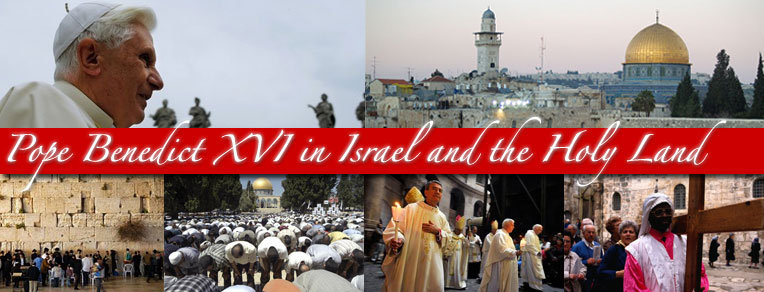A critical mind is one of the most important assets for moral and physical survival - but there are times when one's verbal battles must be chosen with more than usual care. This is certainly true of the pope, whose words in the Holy Land are being scrutinized under a microscope, much like the one needed to read the nano-Bible presented to him by President Shimon Peres.The author goes on to contrast John Paul II's approach to the matter with Pope Benedict's, noting: "The young Joseph Ratzinger had quite another wartime youth experience, and he lacks his predecessor's direct link between heart and speech." However, she adds:The pontiff's speech at Yad Vashem on Monday was philosophical. It is true that he did not make apologies for historic crimes in his speech. But he did something else, something urgent: He reminded the world that anti-Semitism is still rearing its ugly head, and he committed the Catholic Church to combating it worldwide - today and tomorrow.
The Bishop of Rome does seem to have chosen the road of reason over that of the heart. But it would be hard to claim that he is not making a supreme effort to explore it for heart-felt causes: to promote peace within and between human beings, and to purify the meaning of vital words such as human, freedom and rights.
Michael Sean Winters believes "before the enormity of evil that was the Shoah, silence is an appropriate emotional response" (America May 13, 2009):
Silence is not, of course, an appropriate political response and the Pope made clear that we must speak out so that the world will never forget what happened. But, he is being criticized for not saying something "touching" as one columnist wrote. It is unfair. [...]I do not know what Pope Benedict felt when he went to Yad Vashem. His words, "I have come to stand in silence before this monument, erected to honor the memory of the millions of Jews killed in horrific tragedy of the Shoah" seemed to me excruciatingly appropriate. This Pope – who never tires of telling us Christians that our faith is about God and therefore about us, not the other way round – seemed to be saying, "My visit here is not about me. It is about the victims and their God." That may not play well in an age when our culture encourages vicarious emotional responses. But, it struck me as profoundly true.
The Pope did what he does: He looked at us poor children of Eve and pointed us towards God. His emotional reticence keeps the spotlight pointed away from himself, not only because he is shy, but because the Pope believes his job is to shine the light on God in a world in danger of forgetting Him. At Yad Vashem, like Auschwitz-Birkenau, you can smell the evil, the radical absence of God. To point us to God in such a place is no small gift and no small ministry.
The Pope's Mideast's Minefields - The New York Times' "Room for Debate" blog:
Pope Benedict XVI’s tour of the Middle East this week was expected to cross several political minefields, and so it has. After his visit on Monday to the Yad Vashem Holocaust memorial, some Israelis complained that the German-born pope spoke only in generalities about the Holocaust and did not mention Nazi Germany. Does that criticism have some validity, or is it unfair?Responding to the question: Rabbi James Rudin (American Jewish Committee); Colleen Carroll Campbell (Ethics and Public Policy Center); Daniel Gordis (Shalem Center) and John L. Allen Jr. (The National Catholic Reporter).










No comments:
Post a Comment